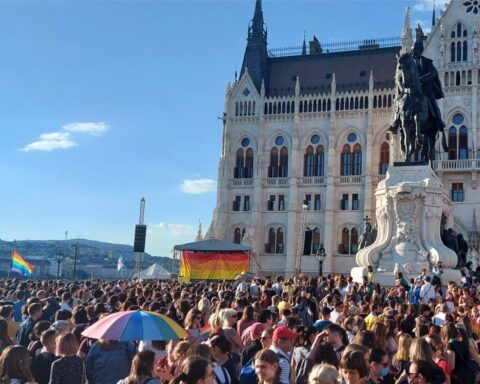BUDAPEST — Critics have slammed the legislation as an attack on the rights of lesbian, gay, bisexual, and transgender (LGBT) people.
A total of 157 lawmakers backed the legislation on June 15 in the 199-seat parliament, which is controlled by Prime Minister Viktor Orban’s ruling Fidesz party.
Opposition lawmakers boycotted the vote with the exception of those from the right-wing Jobbik party, which supported the bill.
On June 14, thousands of protesters gathered in Budapest to condemn the legislation. It calls for a ban on books, films, and other content that are accessible to children and young people and in which sexuality is depicted other than heterosexuality.
The ban also applies to advertising in which homosexuals or transgender people appear as part of normality.
It was not clear what punishments could be meted out for those convicted of breaking the new law.
Orban’s government has said that the legislation is needed to protect the “right of children to their gender identity received at birth.”
Associations of the LBGT community and human rights advocates have said the law will “trample on the rights of homosexual and transgender youth.”
They compared the ban to a discriminatory 2013 Russian law banning so-called “gay propaganda,” which is viewed by human rights defenders as a tool of discrimination.
The legislation also has been criticized by the European Parliament’s rapporteur on the situation in Hungary, French lawmaker Gwendoline Delbos-Corfield from the Group of the Greens.
“Using child protection as an excuse to target [LGBT] people is damaging to all children in Hungary,” she has said.
Orban’s government has backed a strongly conservative social agenda and stepped up anti-LGBT measures during the coronavirus pandemic.
His government has already embedded language in the constitution stating that marriage can only be between a man and a woman. It also has banned adoptions by same-sex couples.
Hungary’s government has also retroactively prohibited legal status for transgender people, in a move ruled unconstitutional by the Constitutional Court.






